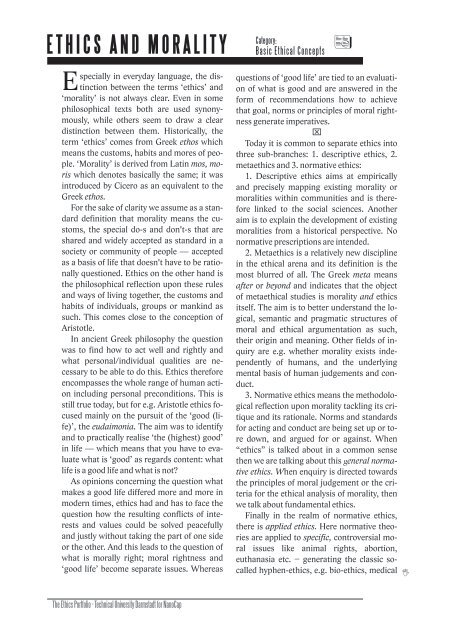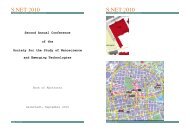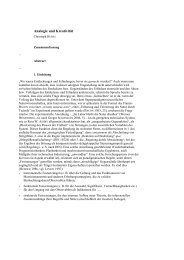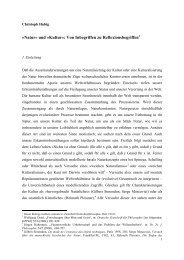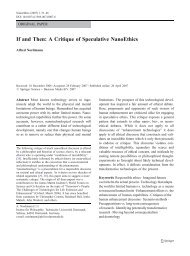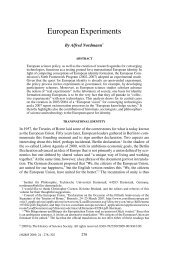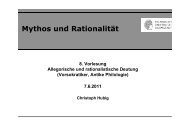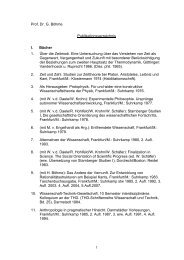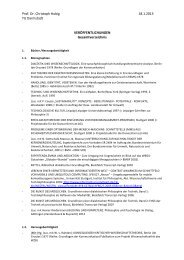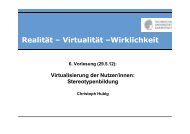ETHICS AND MORALITY Category: - Institut für Philosophie
ETHICS AND MORALITY Category: - Institut für Philosophie
ETHICS AND MORALITY Category: - Institut für Philosophie
Create successful ePaper yourself
Turn your PDF publications into a flip-book with our unique Google optimized e-Paper software.
<strong>ETHICS</strong> <strong>AND</strong> <strong>MORALITY</strong><br />
Especially in everyday language, the distinction<br />
between the terms ‘ethics’ and<br />
‘morality’ is not always clear. Even in some<br />
philosophical texts both are used synonymously,<br />
while others seem to draw a clear<br />
distinction between them. Historically, the<br />
term ‘ethics’ comes from Greek ethos which<br />
means the customs, habits and mores of people.<br />
‘Morality’ is derived from Latin mos, moris<br />
which denotes basically the same; it was<br />
introduced by Cicero as an equivalent to the<br />
Greek ethos.<br />
For the sake of clarity we assume as a standard<br />
definition that morality means the customs,<br />
the special do-s and don't-s that are<br />
shared and widely accepted as standard in a<br />
society or community of people — accepted<br />
as a basis of life that doesn't have to be rationally<br />
questioned. Ethics on the other hand is<br />
the philosophical reflection upon these rules<br />
and ways of living together, the customs and<br />
habits of individuals, groups or mankind as<br />
such. This comes close to the conception of<br />
Aristotle.<br />
In ancient Greek philosophy the question<br />
was to find how to act well and rightly and<br />
what personal/individual qualities are necessary<br />
to be able to do this. Ethics therefore<br />
encompasses the whole range of human action<br />
including personal preconditions. This is<br />
still true today, but for e.g. Aristotle ethics focused<br />
mainly on the pursuit of the ‘good (life)’,<br />
the eudaimonia. The aim was to identify<br />
and to practically realise ‘the (highest) good’<br />
in life — which means that you have to evaluate<br />
what is ‘good’ as regards content: what<br />
life is a good life and what is not?<br />
As opinions concerning the question what<br />
makes a good life differed more and more in<br />
modern times, ethics had and has to face the<br />
question how the resulting conflicts of interests<br />
and values could be solved peacefully<br />
and justly without taking the part of one side<br />
or the other. And this leads to the question of<br />
what is morally right; moral rightness and<br />
‘good life’ become separate issues. Whereas<br />
The Ethics Portfolio - Technical University Darmstadt for NanoCap<br />
<strong>Category</strong>:<br />
Basic Ethical Concepts<br />
<br />
questions of ‘good life’ are tied to an evaluation<br />
of what is good and are answered in the<br />
form of recommendations how to achieve<br />
that goal, norms or principles of moral rightness<br />
generate imperatives.<br />
<br />
Today it is common to separate ethics into<br />
three sub-branches: 1. descriptive ethics, 2.<br />
metaethics and 3. normative ethics:<br />
1. Descriptive ethics aims at empirically<br />
and precisely mapping existing morality or<br />
moralities within communities and is therefore<br />
linked to the social sciences. Another<br />
aim is to explain the development of existing<br />
moralities from a historical perspective. No<br />
normative prescriptions are intended.<br />
2. Metaethics is a relatively new discipline<br />
in the ethical arena and its definition is the<br />
most blurred of all. The Greek meta means<br />
after or beyond and indicates that the object<br />
of metaethical studies is morality and ethics<br />
itself. The aim is to better understand the logical,<br />
semantic and pragmatic structures of<br />
moral and ethical argumentation as such,<br />
their origin and meaning. Other fields of inquiry<br />
are e.g. whether morality exists independently<br />
of humans, and the underlying<br />
mental basis of human judgements and conduct.<br />
3. Normative ethics means the methodological<br />
reflection upon morality tackling its critique<br />
and its rationale. Norms and standards<br />
for acting and conduct are being set up or tore<br />
down, and argued for or against. When<br />
“ethics” is talked about in a common sense<br />
then we are talking about this eneral normative<br />
ethics. When enquiry is directed towards<br />
the principles of moral judgement or the criteria<br />
for the ethical analysis of morality, then<br />
we talk about fundamental ethics.<br />
Finally in the realm of normative ethics,<br />
there is applied ethics. Here normative theories<br />
are applied to specific, controversial moral<br />
issues like animal rights, abortion,<br />
euthanasia etc. − generating the classic socalled<br />
hyphen-ethics, e.g. bio-ethics, medical
<strong>ETHICS</strong> <strong>AND</strong> <strong>MORALITY</strong><br />
<br />
ethics, business-ethics, nano-ethics etc.<br />
Inversely, these special issues constantly<br />
challenge theory and demand improvements,<br />
changes and specifications.<br />
Alongside hyphen-ethics it is also possible<br />
to distinguish between ethics that focuses on<br />
societal and institutional dimensions (social<br />
ethics) or on the individuum (individual<br />
ethics).<br />
While we consider applied ethics to be a<br />
sub-branch of normative ethics, other moral<br />
philosophers treat it as a discipline on the same<br />
level as normative ethics, arguing that it<br />
Fig 1: Basic sketch of<br />
ethical disciplines<br />
uses normative elements but is independent<br />
otherwise.<br />
<br />
In normative ethics there are different<br />
theories as to how criteria of moral conduct<br />
should be defined. The three main theories<br />
can be sketched as follows:<br />
1. Deontological, i.e. duty theories locate<br />
the basis of morality on specific, foundational<br />
principles of duty and obligation. These<br />
principles are binding regardless of the consequences<br />
that acting on their basis might<br />
bring.<br />
Links to other Portfolio sheets:<br />
The Ethics Portfolio - Technical University Darmstadt for NanoCap<br />
<strong>Category</strong>:<br />
Basic Ethical Concepts<br />
2. Consequentialist theories on the other<br />
hand determine the value of an action on the<br />
grounds of a cost-benefit analysis of its consequences.<br />
If the positive consequences outweigh<br />
the negative ones then the action is<br />
morally proper.<br />
3. Virtue theories focus on a given set of<br />
rules like “do not steal” etc. But instead of<br />
defining them merely as obligatory duties,<br />
the emphasis lies on the individual to develop<br />
good habits of character based on these<br />
rules (and avoid vices). Thus virtue theory<br />
emphasises moral education.<br />
<br />
Q: What are “codes of ethics/conduct”<br />
or what is “ethical research”? Shouldn‘t that<br />
be called moral? A: By calling research or a<br />
code “ethical”, the authors want to point out<br />
that the moral rules they set up are based on<br />
rational deliberation and can be subject to<br />
critique.<br />
Q: Looking at the definitions of ethics and<br />
morality − what is moral philosophy? A: It is<br />
mostly used as a synonym for ethics. Some,<br />
like the French philosopher Jean-Pierre Dupuy<br />
use it differently. For him ‘ethics’ stands<br />
for the effort to force everything into universal<br />
harmonized principles while ‘moral philosophy’<br />
endures colliding or incompatible<br />
values or concepts in the discourse.<br />
<br />
Nano-Ethics Code of Conduct Soft Regulation<br />
STEFAN GAMMEL<br />
Literature: Print & WWW<br />
Frankena, W.: Ethics. Prentice Hall, 2/1973; http://www.ditext.com/frankena/ethics.html<br />
Dupuy, J.-P.: Complexity and Uncertainty. A Prudential Approach to Nanotechnology. UNESCO, 2005;<br />
http://portal.unesco.org/ci/en/files/20003/11272944951Dupuy2.pdf/Dupuy2.pdf<br />
MacIntyre, A.: A Short History of Ethics - A History of Moral Philosophy from the Homeric Age to the<br />
Twentieth Century. Routledge, 2006.


